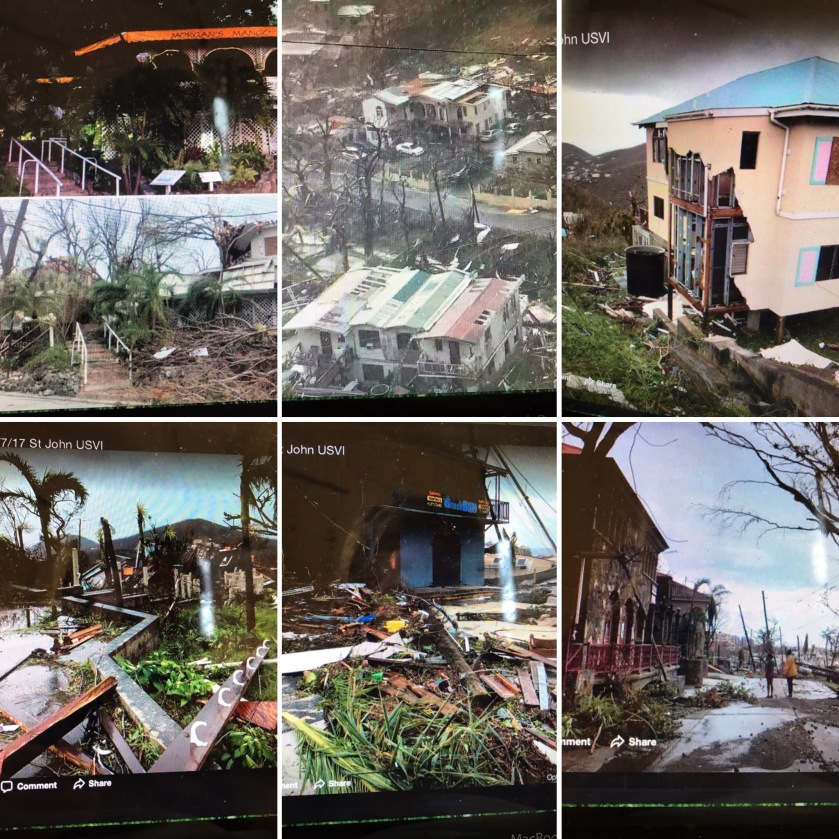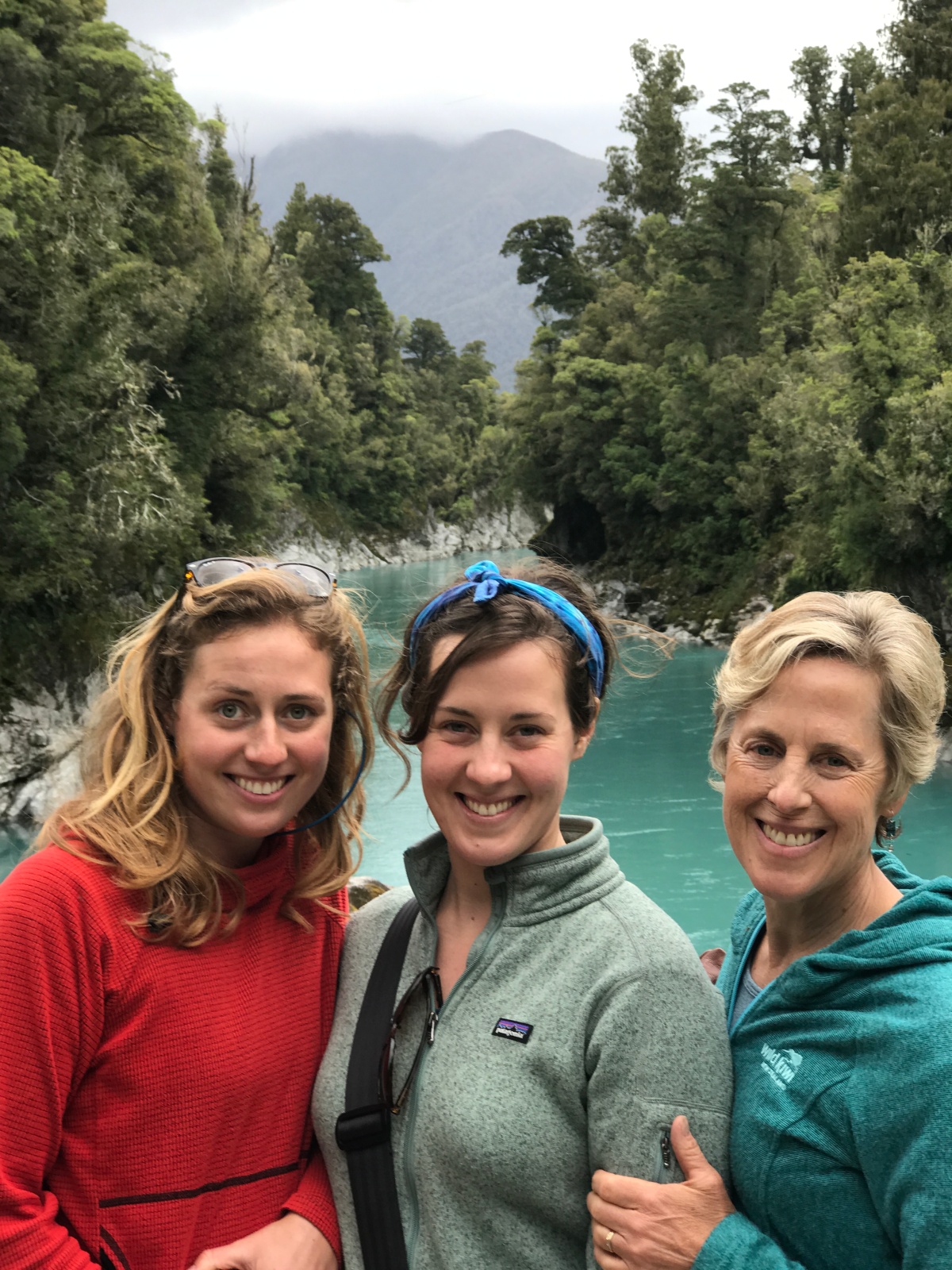O.K., Irma, I’ll give you your due. You are one strong woman. You are the strongest hurricane to hit the Atlantic in the history of modern cyclone tracking. People who lived through Hugo and Marilyn and Ivan say you are the biggest and baddest of them all. Poor Jose: he looked tough out there, but coming on your heels anyone would look like a child.
Although there have been hurricanes or typhoons in “Category 5” before, by maintaining 185+ mph for 37 hellish hours in the Caribbean, and maintaining full hurricane status for 12 — count them, 12 — days, you shattered all the records. At the top of Bordeaux Mountain in the Virgin Islands, the winds at one point gusted to 218 miles per hour. There are no words for that. None.

Look what you’ve done: You’ve killed more than fifty people. You’ve flooded a whole state. And you’ve devastated some of the most beautiful islands in the Caribbean, including one where we own — used to own — a home.
You’ve left local economies in shambles. You’ve turned green paradises into brown wastelands, with trunks of trees sticking oddly to the sky with no leaves anywhere to be found, and boats of any size tossed like toys onto the land. You’ve ripped the clothes off things, denuding the land, making secluded cabins lose all privacy and quaintness.

Perhaps, like a child having a tantrum, you were only doing your job. It’s not your fault that we humans have warmed the earth to levels where storms have no choice but to gain intensity. It’s not your fault that we forget that Mother Nature is still the boss. It’s not your fault that the world’s largest carbon producer and largest economy pulled out of the Paris agreement trying to slow down this deadly warming of the planet. Perhaps you were just trying to tell us something that we’ve refused to accept for quite a long time now.
Irma, you will not be forgotten. It will take years for people to rebuild. Even Lloyds of London will take note of you, as insurers call in reinsurance claims. People will be remembering you decades from now, when some solar panel flung deep in the woods is noticed by a bewildered hiker: How did that get here?
But Irma you’re not the only strong gal out there. Let me tell you about some strong women I know, who I’m really proud of. They’re not the only ones; they just happen to be the ones I’m closest to. And you know what, Irma, they’re just as strong as you are. They might even be strong enough to harness your energy into something positive. Let me introduce you:
Eliza Thomas, 21: senior at Carleton College, geology major, interested in environmental issues just like you, Irma. She’s been going to St. John since she was five. She’s got energy and spunk, and writes:
“I’m doing my best to lean into the growing pains of the last few days. … One of the most constant places in my life was just decimated by Hurricane Irma, our sweet little house, along with so many other people’s homes and belongings gone… My heart is heavy for our neighbors who have called St. John home after so many generations … I can’t help but notice what symbolic timing this is [at the start of my final year of school]. How things so integral to your life, so constant, can change on a dime and never be the same. It’s my hope that this year will be one of strength, regeneration, community, and peace amidst uncertainty.”
Emma Thomas, 26: teacher, facilitator, humanist, history lover. She’s got a few words for all of us about how we got here and where we might go:
“What really made the grief flow was seeing the trees, grey spindly skeletal branches, whole hillsides of them, looking oddly bleak next to the turquoise water. All the leaves gone, totally denuded. It looked like a nuclear bomb had gone off.
So now, grief. And through grief, love. And through love, hope and community and bold action as part of this ailing Earth. Reposting what I wrote the other day, before we knew these details, because it’s still true and because we need to spread the word about these islands.
St. John is one place where our family’s heart has lived for the past 18 years. Winds of 185 miles per hour battered this precious corner of the world for hours when Irma hit. The destruction — of people’s homes and businesses, of trees, of wildlife, presumably of coral reefs — is unprecedented. There is so much loss. All cell towers were blown down in the storm, so there’s not much communication coming out of the island. We still don’t know the extent of the damage to our little treehouse home, created with so much love by my parents, although we have heard that most wooden structures on the island were destroyed or lifted off their foundations. We’re expecting the worst.
But home isn’t confined to a building — mostly, my heart aches for our neighbors, for people whose home this island has been for generations, for whom trauma caused by powerful white supremacist capitalism began during Native genocide and slavery and continues today through climate change. I ache for them in a world that has demanded their resilience over and over again.
Home is home in the details. The names of our neighbors. Those sweet foresty smells and sounds. The sting rays who live in the bay, and the way the water lights up with phosphorescence at night when we’re skinny dipping. The birds that love to perch on the graceful, welcoming arm of the tree by our deck. The delicate magenta flowers that spread themselves wide in the sun on top of the old sugar mill ruins, and the magic of hanging suspended above waving fan coral at Haulover Bay while fish and eels do their underwater dance below our feet.
Undoubtedly, those pink flowers regrow, leaves will bud again, and people will rebuild their homes if they choose and if they are able. I know change is the only constant, and I’m learning to get comfortable with it. But there is a profound grief that arises when a place you know and love so intimately — a place woven into the fabric of who you are — is battered and changed so fundamentally by a violence come home to roost in the most vulnerable places. Forcibly extracting oil from the Earth and burning it is a deep, arrogant violence, and that violence cycles and spirals out as the planet warms and weather patterns intensify, often targeting people and places who are not those primarily responsible for the violence in the first place.
When the flooding and destruction is happening in a place I don’t know, somewhere whose particularities don’t feel like a map of my own body, it’s hard for me to really connect to my grief. And when I can’t connect to grief, I can’t connect to love, the fierce kind of love that makes me want to fight like hell. So that’s the crack where the light gets in, I think — that as climate change impacts more and more of our homes, we will be able to fully access our grief, anger, and fear, and by moving through those responses, know them to be an expression of our love, our passion for justice and wholeness, our connectedness to each other, and our oneness with this Earth. As Earth lives, we live. As Earth dies, we die. May we grieve and love our homes in the details and act boldly together from that place of intimacy.
Polly, 58, doctor of science, environmental expert, creator of communities and loving spaces. Having seen her work of two years tossed aside in a day, she still holds the big picture and the possibilities, even in her grief. In a letter to the NYTimes she writes:
“… As Irma barreled towards Florida, no network returned to the devastation on St. Thomas and St. John. We need to keep covering Irma in the Virgin Islands out of respect: because their tragedies are not less important than ours. We need to keep talking about Irma there because they need our financial support and our tourist dollars, now and in the months to come. And we need to keep asking for their stories because they have experience that we do not. We need to understand what it sounds like to have your roof lifted off by 185 mph sustained winds; what it feels like to be unable to find your child; or to see your workplace and economy destroyed, because this is our future if we do not seize this moment. We need to get proximate with the details of this storm so that we can know in our bodies the urgency of driving innovation away from fossil fuels as we are fully capable of doing, and catalyzing a change in US policy. Let us return again and again to St. Thomas and St. John, to their courageous and resilient people, to their spectacular beaches, and to the extraordinary devastation they are in the midst of now. Let us heed Irma’s call.”

Am I lucky or what?
Rebuilding won’t be easy. Even now as I write this, one week after the storm, we have had no communications from our property manager or builder, and therefore no one has been to our house. We know of course that they’ve got their own struggles first and foremost before contacting us, even if they could. (One week after the event, there is no electricity, no cell phones or landlines, no internet.) Whatever remains of that adorable structure now holds standing water and soaking broken debris. What might have been saved a week ago may not be savable by the time we are able to get there.
All that care and love that Polly poured into the details, making a space livable and fun and beautiful without being fancy — her signature — will now have to be shoveled out of the mud and debris first. Where is that cute little painting from the artist from St. Croix? Where did our roof land? Do we just leave it there if we ever find it? What must it have been like to have a metal roof with ten solar panels take to the sky? Is the refrigerator still there, or did that fly away with the rest of it? Our bed? Is it there, still perfectly made but smothered by trees, or somewhere up the hill in what used to be woods? The mind wanders, with a grainy aerial photo the only evidence, leaving the rest to one’s imagination.
We will rebuild, but we have no clue what the process will be or even if what we build will be the same as what was there before. We can’t leave St. John, though. It has gotten into our bones, and to abandon the place now would be the worst of all possible outcomes. No, we’ll go down and figure something out. We’ll get some friends to help us (come join us and make it a party); we’ll help out our neighbors, and we’ll encourage our friends to keep coming down because St. John needs us. St. Thomas needs us. Our friends who lost their homes need the work to rebuild their own lives. THEY NEED US TO KEEP COMING.
Irma, you landed a really good punch. No disrespect. But I need you to know that there is an army of love and commitment that you’ve just unleashed. You’re not the only one with muscle, big girl. Thanks for sharing your thoughts on how dumb it is to heat the water the way we’re going. Your havoc probably won’t get through to the people it needs to, but hey you did your part.
Meanwhile, we’ll get to work. And we will find strength in each other, and in our beliefs of what is possible with energy and vision and perseverance.
Lucky me: I don’t have to go far for buddies in the journey. I’ve got three amazing Amazons by my side.
Appendix:
Woody Guthrie wrote a humorous but poignant tribute to the “Oakies” of the Dust Bowl in a song called My Oklahoma Home. I thought of this song as I contemplated our home being blown around in the air.
Bruce Springsteen recently brought the song back to life with the Seeger Sessions Band, in honor of the late great Pete Seeger. Here’s a clip:
Here’s Pete Seeger’s more gentle, Guthrie-like version:
Trying to find some solace in humor, I changed a few of the lyrics to suit our St. John circumstances:
When they closed up Maho Bay
We just couldn’t stay away
We wanted a place to romp and play
And so we made the race
And we staked ourselves a place
And settled down ’round Hawksnest Bay
It blowed away
It blowed away
My St. John home it blown away
Well it looked so green and fair
When I built my shanty there
Now my St. John home is blown away
Well I planted lemons and limes
Invested some nickels and some dimes
Aimed to have fruit and fish to feed my face
Got Carlson’s to take a chance
Got Alfredo’s to do the plants
Also got a fancy mortgage on this place
Well it blowed away
It blowed away
All the things we’ve done have blown away
Well you can’t grow any thing
When all you got is drivin rain
Everything except my mortgage blown away
Well it looked so green and fair
When I built my shanty there
I figured I was all set for life
I put on my Sunday best, with my fancy scalloped vest
And I went to town to pick me out a wife
She blowed away
She blowed away
My St. John woman blowed away
Mister as I bent to kiss her
She was picked up by a twister
My St. John woman blown away
Well then I was left alone just listenin’ to the moan
Of wind around the corners of my shack
So I took off down the road yeah
When that nasty west wind blowed
I traveled with the wind upon my back
I blowed away
I blowed away
Chasin’ that rain cloud up ahead
Once it looked so green and fair
Now it’s all up in the air
My St. John home is all over head.
Well now I’m always close to home it blown away
But my home Sir is always near
It’s up in the atmosphere
My St. John home is blown away
Well I’m roam’n St. Johnian
But I’m always close to home
I’ll never get homesick until I die
‘Cause no matter where I’m found
My home is all around
My St. John home is in the sky
It blowed away
It blowed away
My place down on Hawksnest Bay
Now is all around the world
Where ever rain or dust is swirled
There is some from my St. John hideaway
Oh and it’s blown away
It’s blown away
Oh my St. John home is blown away
Yeah, it’s up there in the sky
In that rain cloud over n’ by
My St. John home is in the sky



Our hearts go out to you and all who suffered devastating loss. Thanks for sharing these heartfelt musings and once again demonstrating your family’s grit! Sorry we did no see you in Maine this summer to give you a hug.
LikeLike